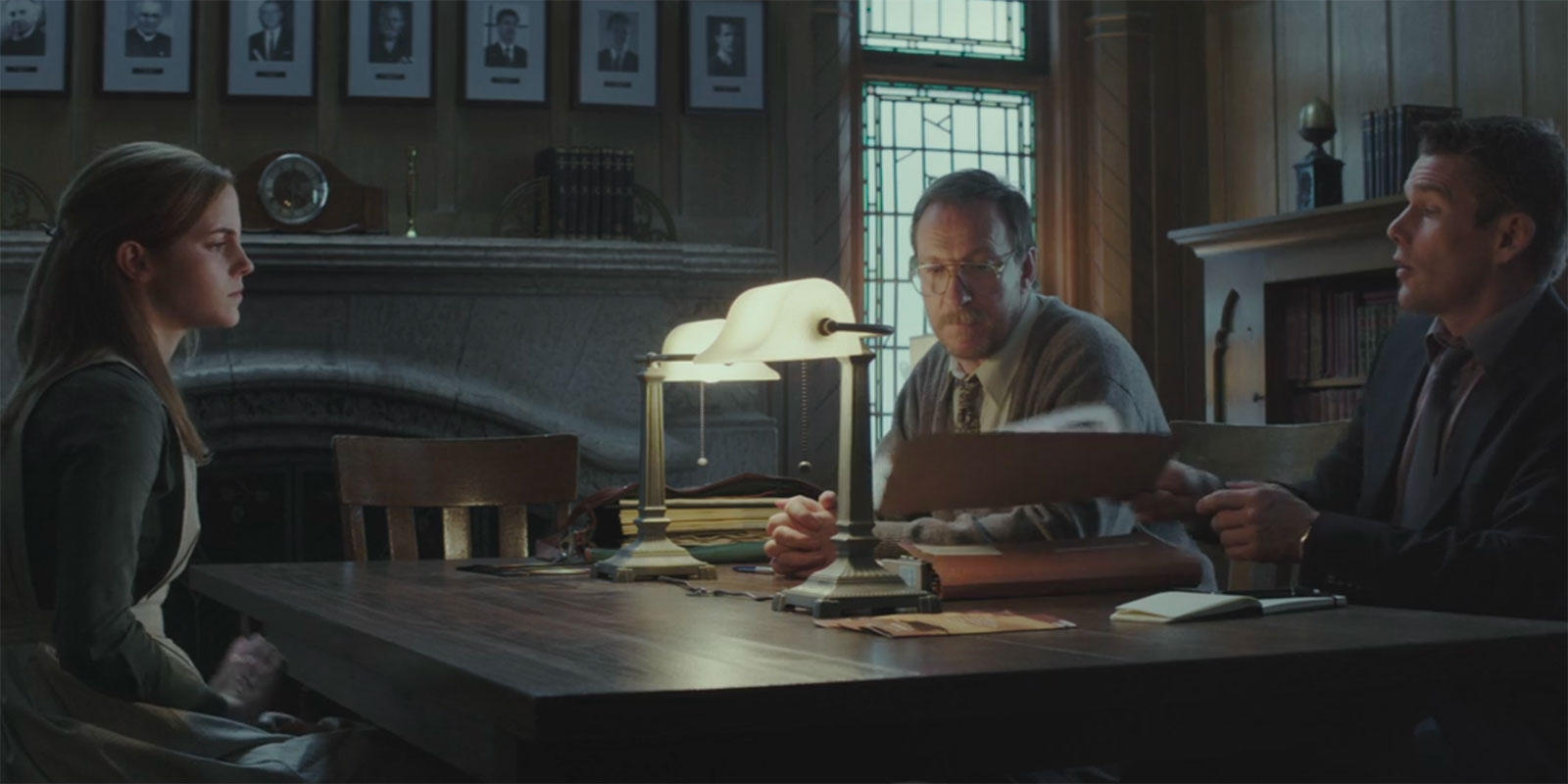On some level, I feel like sitting down to watch this movie a day after I watched Hereditary will immediately form an unfair opinion. On the other hand, I also feel that Regression would still be plagued with issues even if I hadn't watched these two films back to back.
A 2015 thriller starring Ethan Hawke as Detective Kenner, David Thewlis as Professor Raines, and Emma Watson as a teenage Angela, Regression starts off with a police department investigating a horrific case of abuse.
Angela has accused her father of sexual assault, and when he's brought in for questioning he admits he could have done it. Unfortunately he has no recollection of the event.
In order to get a confession out of him, Kenner brings in Raines to try a "regression" technique on Angela's father. This technique will supposedly get him to recall past memories of the crime. Instead, they discover evidence of a Satanic cult currently operating out of their small, sleepy village.
From the onset, Regression makes it clear that it's directly critiquing the "Satanic Panic" that swept through the United States during the 1980s and early 90s. This critique is a good thing, and mass hysteria needs to be examined so we can avoid it in the future.
Unfortunately—in the service of critiquing a moral failing—Regression falls headfirst into another of its own making. And oh man, the end result is ugly.
The Good
The start of this film actually captured my attention in a good way. I clicked on Regression thinking it would be a supernatural horror, but the film quickly revealed itself to be a psychological thriller. Even still, I quickly adjusted to the change of pace.
The town where this hysteria occurs is an otherwise quiet place that is steeped in relics of the early 1990s. All throughout the film, you see new technology mixed with old cultural norms in a manner that was indicative of the era.
This "90s mindset" can be seen most vividly in the characters of Kenner and Raines, who consider themselves to be progressive thinkers because they don't believe in all this "Satanic nonsense".
This is contrasted with their blind spots when it comes to women and mental health, neither of which they fully understand nor realize they are ignorant to due to the context of their situation.
In their minds, they're already ahead of the curve because they don't cling to fears of devil worship and believe in technological progress. So what sort of "self-reflection" do they need? Evidently, not much.
I'm also glad to see Satanic Panic being explored in depth, because it was an incredibly interesting time period and something that precipitated a huge cultural shift in North America.
If I was being charitable, I would say that it's a nod to the Salem Witch Trials, as the way that this town falls apart follows the general beats of this very famous real life event. Regression seems to posit the idea that human behaviour, regardless of the time period, is predictable.
Unfortunately that's where my appreciation for this film ended.
The Bad
As with many films where I have long-standing beef, my issue with Regression lies in the fact that the entire plot hinges on a woman's sexual assault.
When you're talking about sensitive subject matter like this, you need to do so with care and a deeper understanding of the societal implications of it. This is especially true if the victim is a child—and Angela, still seventeen, definitely is.
Without getting too deeply into spoilers, by the midway mark we have a collection of men making proclamations about feminine trauma and the validity of it. The major characters imply that women exaggerate the severity of their victimhood in order to be believed—up to and including accusations of Satanism.
This exploration into Satanism can be coupled with a deeper dive into trauma, of course, but this desire to debunk Satanism shouldn't come at the expense of believing sexual assault victims, or treating their confessions like a joke. This was a problem that Regression couldn't seem to steer away from, time and time again.
If these characters were portraying a symptomatic mindset that was absolutely rampant during the 90s, then the film should have deconstructed this mindset to explain why it was wrong, not reinforce the idea that women are lying.
I mean, Regression was made in 2015. That's recent enough that the filmmakers should be aware of these issues and the power dynamic inherent to them when exploring these narratives in any sort of media.
What's worse is that in this movie, there's a scene where an underage Angela tries to seduce a detective who looks like he's pushing forty.
This is deeply inappropriate for obvious reasons, especially when the narrative implies that this teenage girl is some sort of siren—not a victim of abuse at the whim of a much older man with ten times as much power.
The Verdict
At the end of the day, I really wish Regression had avoided the sexual assault subplot entirely—that it had stuck to the idea of "Satanic Panic" and nothing but.
As it currently stands, Regression mirrors its protagonist, Kenner: believing itself to be progressive when it actually has a large moral failing.
